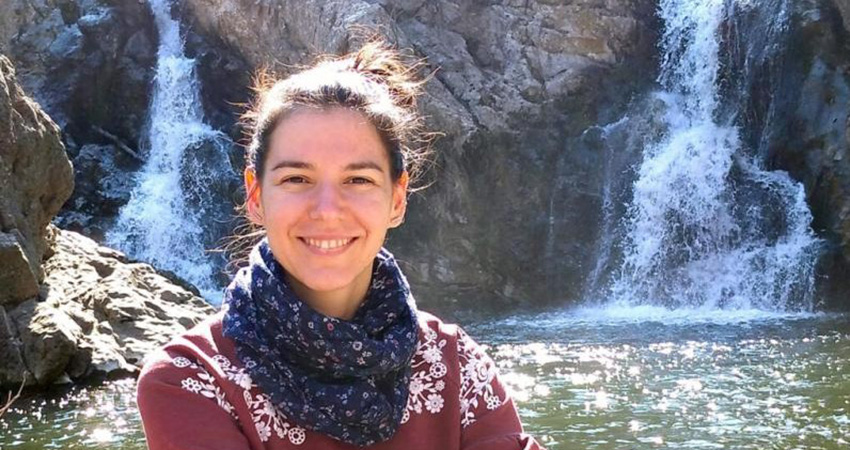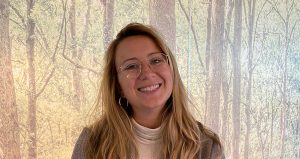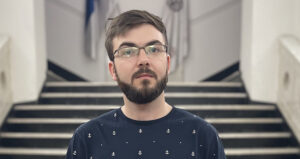Aleksandra: “Water circularity is a major step towards resilience”

-
 Editorial Team
Editorial Team
Share article:
Aleksandra Kulić Mandić is working on wastewater research at the University of Novi Sad in Serbia. According to her, water circularity is a major step towards future resilience. We will have to use treated wastewater in various applications, from industrial to residential scale. Aleksandra is participating in the fourth group of the European Junior Water Programme (EJWP), and is sharing her experiences with Water News Europe.
What and where is your current work position?
“I work as a Research Assistant at the Faculty of Sciences, University of Novi Sad, Republic of Serbia. Here I have studied environmental science and recently defended my PhD. As a postdoc and member of the wastewater treatment research team, my work is based on chemical experiments, data analysis and visualization. I work on two projects: WasteWaterForce is funded at the national level, and SmartWaterTwin is funded at the European level. Both projects are managed by my colleague Đurđa Kerkez, PhD, and I have the opportunity to learn more about sustainable wastewater treatment.”
How do you see the importance of linking European organizations in development programs?
“Thanks to EJWP’s activities – training sections and participants’ projects – we young water people can learn a lot in a short period of time. The various backgrounds of our participant colleagues give the opportunity to see and understand different opinions that can be based on their knowledge or even culture. Linking European organizations is important in sharing knowledge and experience, and here I think of twinning projects in which Western Balkan countries work with highly developed research organizations. Through these kind of actions, we will all benefit: water, people, environment.”
What value do you expect to bring to your organization from your EJWP participation?
“Hopefully, I will bring value to my organization and wastewater treatment research team through new collaboration contacts and new research ideas for project proposals. I am interested in wastewater treatment in a circular economy way, which can be the ground for various applications, thus leaving enough space to work with EJWP participants. During our first training week, held in Athens, we had a chance to meet each other a bit better, which is an important step towards successful collaboration.”
What motivates you to participate in EJWP?
“I am the kind of person who just loves meeting new people, especially enthusiastic ones like Naomi Timmer, leader of EJWP! As an early-stage researcher, I have to work on my professional, knowledge-based skills, as well as broadening my network for future joint proposals. I truly think that EJWP is a great place to be, in the first place to meet new and interesting people from different water backgrounds.”
What value do you expect to bring to your career, community and/or the water sector from your EJWP journey?
“Through EJWP, we have a chance to learn about different water-related aspects from experts around Europe. For example, lectures about how the European Commission, Water Europe or OECD are functioning. We learned about the political and societal aspects of water through this.
This is important to broaden my insights and know-how. Hopefully, this knowledge will help me to impact the Serbian water sector in the future. In addition to this, I believe that my career will benefit from soft skills trainings held by the EJWP team, such as multicultural communication, time
management, and project management.”
What do you think about the importance of soft-skill development for professionals in the water-environmental-research sectors?
“Soft skills, in general, are important. I have realized during my PhD studies, that as scholars, we are focused on the research-related problems, mainly, and how we communicate with either mentors or peers is in another plan. I believe that this is important to learn and constantly develop, as we will from now on be surrounded by professionals with work tasks that have a common goal.”
What is your view on making water resources more resilient to increasing climate impacts in Europe?
“We all know how water cycle works, and it is important to take in mind how used water in the techno sphere is getting more attention. I see water circularity as a major step towards resilience in the future. We have to also do more in water reclamation, using treated wastewater in various applications, from industrial to residential scale. Also, working more on the city water-related problems, like during rainy seasons, we could catch excess rainwater in underground basins and use it in the dry season.”
What and where did you study?
“I can say that the Faculty of Sciences in Novi Sad is my home faculty; here I’ve completed all my studies in the environmental science field. My PhD work was based on the industrial symbiosis principle, or in more detail, the investigation of additional (re)use of various industrial solid wastes and by-products as catalysts of the advanced oxidation process.”
Where and in which position would you like to be working in five years?
“I would like to work more with European water reclamation experts in the future, possibly through the postdoctoral project. Where will that be, time will tell! I am eager to work on this in the next five years, and hopefully in 10 years’ time, I will influence change in my home country.”

















